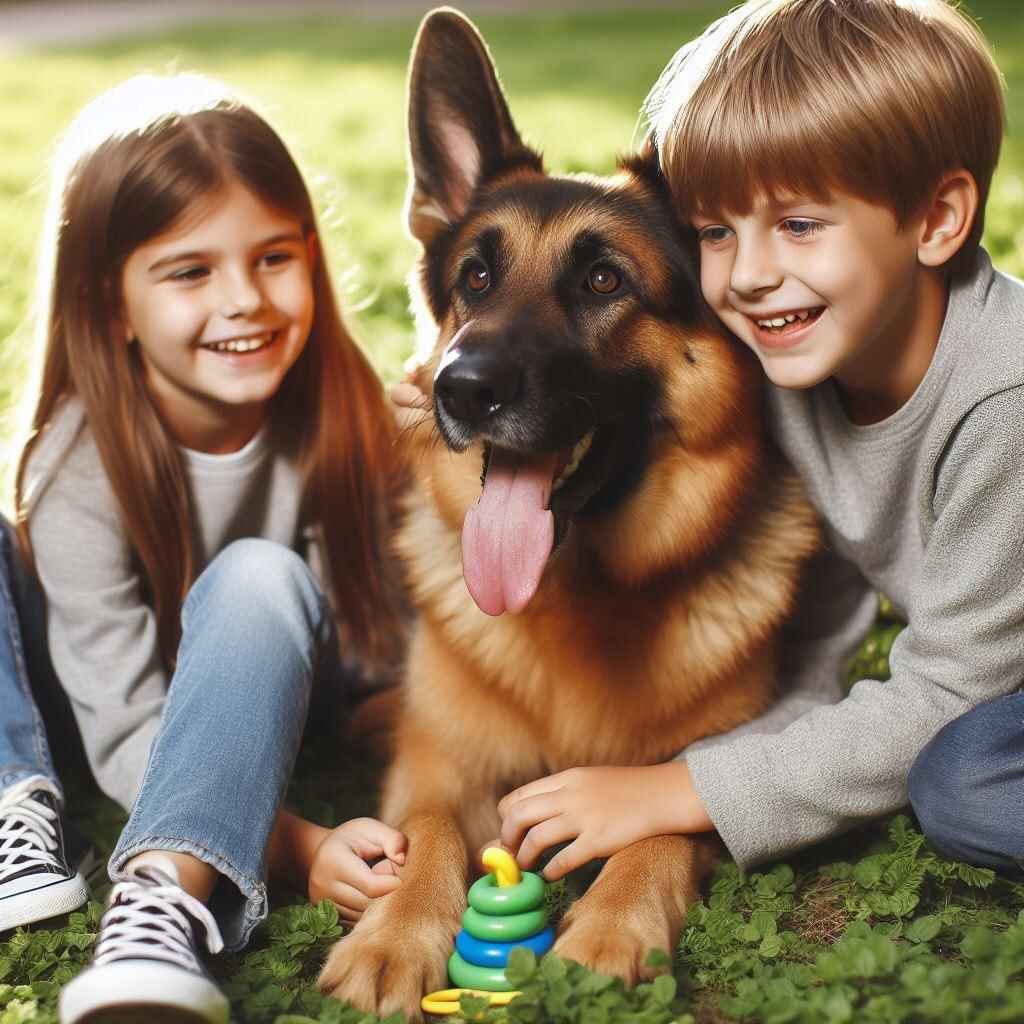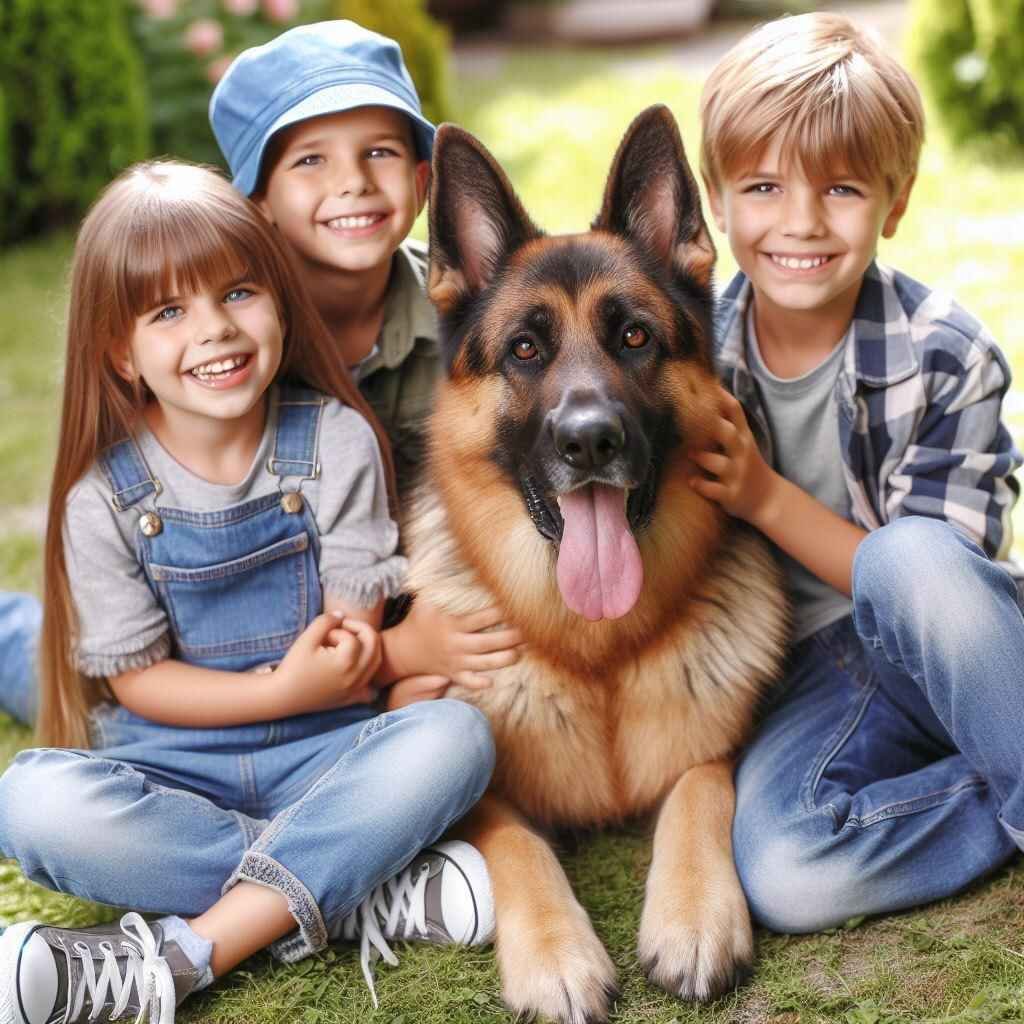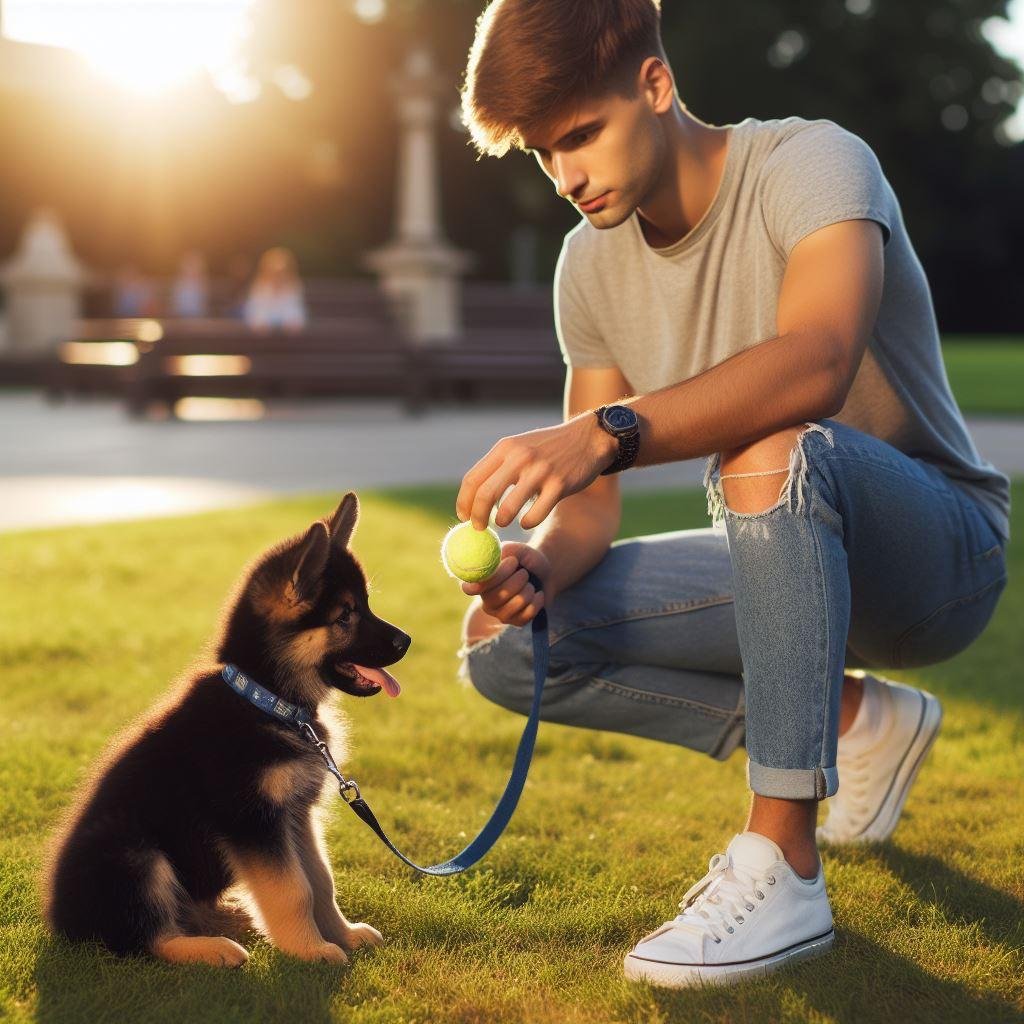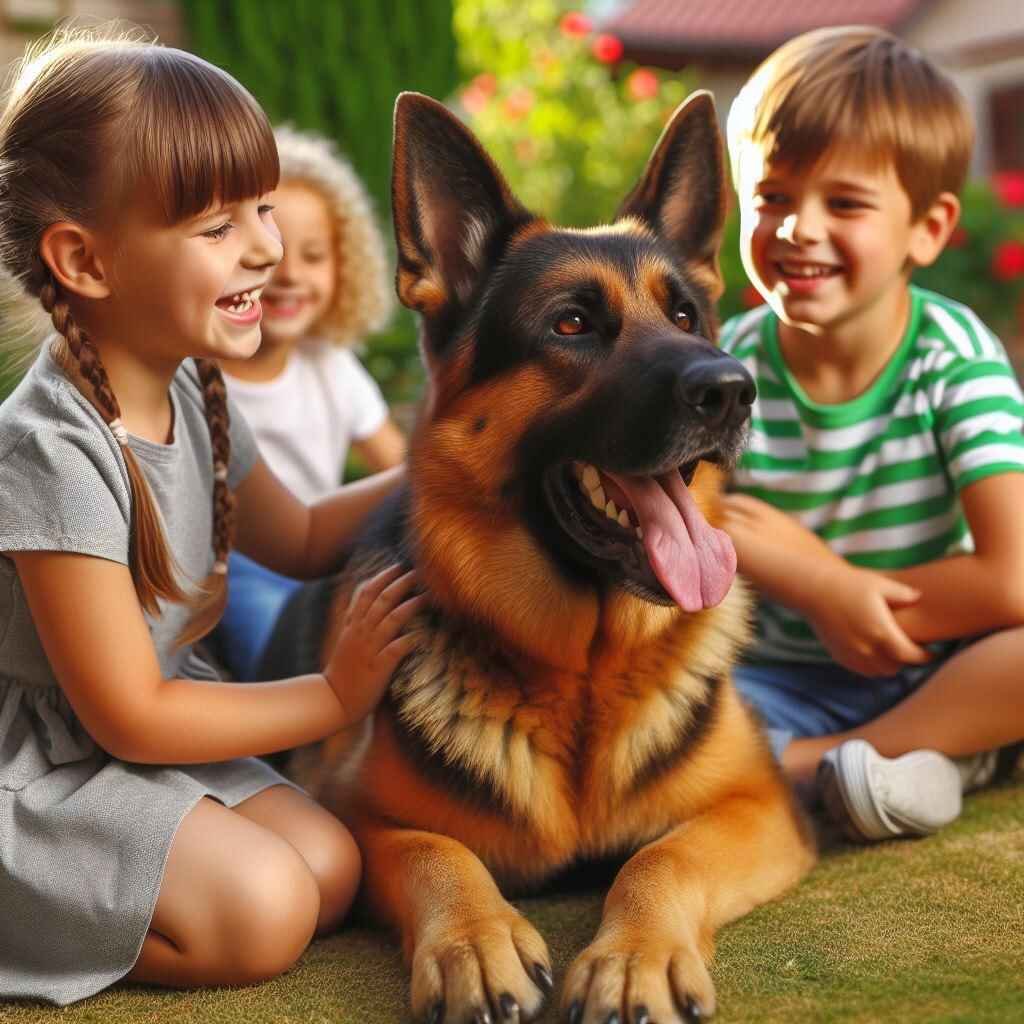Welcoming a German Shepherd into your home is like getting a new family member known for being intelligent, loyal, and protective. These dogs are amazing friends, but because they can be pretty significant and protective, teaching them how to be friendly and get along well with others is essential. “Unlock Your German Shepherd’s Friendly Side: Expert Tips” is your all-in-one guide to help your furry friend show their kinder side. This guide will share easy-to-follow advice and tips from the experts on making your German Shepherd more sociable. We’ll cover everything you need to know to help your dog be a pet, a loved part of your family, and a friendly face to everyone they meet.
German Shepherd training: How to make it friendly
Training a German Shepherd for friendliness hinges on early socialization and positive exposure. Introduce them to diverse people and settings early, teaching them to discern threats and safe interactions.
This approach and consistent, positive reinforcement shape their protective instincts into a controlled, friendly demeanor. The American Kennel Club underscores the breed’s natural caution, advising against unnecessary aggression. For overly protective behaviors, professional guidance is recommended to ensure your German Shepherd becomes a confident, approachable companion.

How to Teach Your German Shepherd to Like People
Teaching your German Shepherd to be friendly with people starts with understanding their unique personality and gradually introducing them to various social situations from a young age. Encourage positive interactions by organizing calm introductions to friends, family, and other dogs, and consider enrolling them in puppy classes for structured socialization.
Through consistent, positive experiences, your German Shepherd can learn to enjoy meeting new people, moving beyond their natural caution to develop a trusting and friendly demeanor. This makes them better companions and contributes to their happiness and social well-being.
Essential Guide to Socializing Your German Shepherd
Socializing a German Shepherd is pivotal in shaping a confident, well-adjusted dog. This process involves exposing your puppy to many experiences, people, and animals in a positive, controlled way. Early socialization is critical, as altering deep-seated fears and anxieties is challenging. Here’s how to do it right:
1. Start Early: Start socializing your German Shepherd as soon as feasible. Puppies are most receptive to new experiences at three to 14 weeks of age.
2. Positive Experiences: Make every new encounter enjoyable. Use treats, praise, and play to create positive associations with new stimuli.
3. Controlled Exposure: Gradually introduce your puppy to various environments, sounds, and beings. Keep these introductions gentle to avoid overwhelming them.
4. Safety First: Ensure all experiences are in safe, controlled settings. This helps prevent negative experiences that could foster fear.
5. Consistency is Key: Regular, varied exposures are crucial. Socialization isn’t a one-time event but a continuous part of your dog’s training.
6. Understand the Stakes: Unsocialized German Shepherds can develop behavioral issues. Recognize that socialization is essential, not optional.
7. Seek Professional Help if Needed: If you’re adopting an older dog or facing challenges, consider enlisting a professional trainer experienced in socialization.
Socializing your German Shepherd paves the way for a friendly, fearless adult dog capable of confidently handling new situations. Remember, a well-socialized German Shepherd is happier and a more integrated family member and community citizen.
Friendly Guardian: Training Your German Shepherd for Sociability

Training a German Shepherd to be friendly, especially around strangers and other pets, involves a strategic approach that respects their protective instincts while encouraging sociability:
1. Early Socialization: Start while they are dogs, introducing them to an extensive range of humans, animals, and environments to construct positive institutions.
2. Positive Reinforcement: Use treats, praise, and affection to reward calm and friendly behaviors, reinforcing these as desirable actions.
3. Gradual Exposure: Increase their comfort with new experiences by gradually exposing them to different situations, ensuring they don’t feel overwhelmed.
4. Consistent Correction: Gently but firmly correct aggressive or overly protective behaviors, teaching them appropriate responses to various stimuli.
5. Patience and Persistence: Recognize that training requires time and consistent effort, especially with older dogs or those with established behaviors.
6. Controlled Environments: Introduce new people and pets in controlled settings where you can manage the interaction, ensuring safety for all involved.
Understand Their Instincts: Acknowledge their protective nature, training them to discern between real threats and non-threatening situations.
7. Professional Guidance: Consider seeking help from an experienced instructor if you stumble upon chronic challenges, ensuring your approach is customized to your dog’s wishes.
This approach helps nurture a friendly German Shepherd and ensures their protective instincts are directed appropriately, making them well-adjusted companions.
To start training your German Shepherd for sociability, you’ll need:

Tasty Treats: Choose small pieces of your dog’s favorite snacks to reward good behavior without overfeeding.
Interactive Toys: Use food puzzles and other toys to make training fun and mentally engaging.
Clicker: Incorporate a clicker for clear, consistent communication during training.
Consistent Schedule: Aim for at least 15 minutes of training daily to build habits effectively.
Patience: Stay patient, as progress may vary each day, but consistency will lead to positive changes.
With these tools and a commitment to regular, positive reinforcement training, you’ll help your German Shepherd become more friendly and well-behaved.
How to Choose the Right Puppy
Puppy Socialization Essentials: Ages 8-16 Weeks
In the crucial 12-16 week period, exposing your German Shepherd puppy to varied people and environments is vital to shaping them into confident adults. This stage teaches them to distinguish friends from threats.
Activities should include interaction with different people and exposure to new sounds and textures, underlining the importance of positive experiences. Trainer Jacqui Foster suggests fun, short games that boost confidence and owner-puppy bonds.
Early grooming habits, introduced gently, prepare them for routine care, turning potential stress into enjoyable moments. Engaging the whole family in these activities broadens the puppy’s social skills and adaptability.
Crate Training (8-16 Weeks):
Adams highlights crate training’s role in fostering independence and preventing separation anxiety. Start with short durations in the crate during meals or chores, gradually increasing time as your puppy adjusts.
Obedience Training (3-9 Months):
Begin basic commands early to tap into the German Shepherd’s strong work ethic. Regular training sessions strengthen the bond with your puppy and lay the foundation for future learning, including good manners and social skills. Structured classes can further this development, preparing your dog for CGC training and ensuring they grow into disciplined, well-adjusted adults.
Reliable Recall:
Teaching your GSD to come when called is crucial for their safety. Start in quiet areas, rewarding them for obeying the “come” command and gradually introducing more distractions. Daily practice, increasing distance, and challenges ensure your dog’s responsiveness.
Impulse Control:
The key to preventing issues like excessive barking or chasing is that impulse control training teaches your GSD to manage their instincts. Begin with simple commands that reward patience, gradually introducing more complex tasks. Activities like obedience and rally sports can further hone this skill, channeling their energy positively.

Maturity Training (9-24 Months):
As GSDs grow, they refine impulse control and obedience. Transition training should include advanced activities like tracking and agility, aligning with their physical and mental development. This period also involves dietary adjustments to support their growth into adulthood.
Focusing on these training goals ensures your German Shepherd develops into a disciplined, well-adjusted adult, capable of adapting to various situations with intelligence and calm.

Conclusion
Fostering a friendly German Shepherd involves early socialization, consistent training, and positive reinforcement. You can nurture a nice, well-behaved companion by gradually introducing them to new experiences, teaching essential commands, and reinforcing good behavior.
Patience and persistence are crucial, as is making training enjoyable for both of you. This approach ensures your German Shepherd becomes a loyal protector and a cherished, friendly member of your family and community.
How do I train my German Shepherd to be friendly?
To help socialize your German Shepherd:
- Spend lots of time with them.
- Play games and give them different toys with which to interact.
- Introduce them to extended family members and friends.
Take them for walks and to dog parks.
How long does it take a German Shepherd to bond?
Duration-wise, it can take six or more months to earn the trust of an adopted GSD for it to bond with you & your family…
Do German Shepherds need some other dog?
German Shepherds are generally okay with different circles of relatives and pets they have grown up with. If they haven’t grown up with a cat or other smaller pets, they’ll have the urge to chase them, so any introductions later in life must be carried out carefully.
FAQs about German Shepherd’s Friendly Side
Can Working Line German Shepherds be kept as family pets?
Absolutely! Despite their strong work ethic, working-line German Shepherds can thrive in family settings. With proper training and socialization, they make loyal and loving companions for households of all sizes.
What Sets Working Line German Shepherds Apart from Other Lines?
Working-line German Shepherds stand out due to their practical build and a remarkable blend of intelligence and work ethic. This makes them excel in various tasks, from police work to search and rescue, setting them apart from show and pet lines.
How Much Exercise Do Working-Line German Shepherds Require?
These dogs have high energy levels, so regular exercise is essential. Plan for at least 60–90 minutes of daily physical activity, including walks, playtime, and mental stimulation, to keep them happy and healthy.
Do working-line German shepherds have specific health concerns?
Some health issues are common to all breeds. Regular veterinary check-ups, a balanced diet, and maintaining a healthy weight can help address concerns such as hip dysplasia and other genetic conditions.
Can Working Line German Shepherds be Trained as Service Dogs?
Absolutely! Their intelligence and trainability make them excellent candidates for service roles. Many working-line German Shepherds are successfully trained as guide dogs, therapy dogs, and even in roles assisting individuals with special needs.
